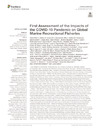Identificador persistente para citar o vincular este elemento:
https://accedacris.ulpgc.es/handle/10553/114418
| Título: | First Assessment of the Impacts of the COVID-19 Pandemic on Global Marine Recreational Fisheries | Autores/as: | Pita, P Ainsworth, GB Alba, B Anderson, AB Antelo, M Alos, J Artetxe, I Baudrier, J Castro Hernández, José Juan Chicharro, B Erzini, K Ferter, K Freitas, M Garcia-de-la-Fuente, L Garcia-Charton, JA Gimenez-Casalduero, M Grau, AM Diogo, H Gordoa, A Henriques, F Hyder, K Jimenez-Alvarado, D Karachle, PK Lloret, J Laporta, M Lejk, AM Dedeu, AL Martin-Sosa, P Martinez, L Mira, AM Morales-Nin, B Mugerza, E Olesen, HJ Papadopoulos, A Pontes, J Pascual-Fernandez, JJ Purroy, A Ramires, M Rangel, M Reis, JA Sanchez-Lizaso, JL Sandoval, V Sbragaglia, V Silva, L Skov, C Sola, I Strehlow, HV Ustups, D van der Hammen, T Veiga, P Venerus, LA Verleye, T Villasante, S Weltersbach, MS Zarauz, L |
Clasificación UNESCO: | 531201 Agricultura, silvicultura, pesca 310504 Protección de los peces |
Palabras clave: | Fishers' profiles Leisure activities Expert knowledge Fishery surveys Virus outbreak |
Fecha de publicación: | 2021 | Proyectos: | RECREGES II project under Grant ED481B2018/017 Grupo de Referencia Competitiva GI-2060 AEMI, under Grant ED431C2019/11 EQUALSEA Grant Agreement No. 101002784 CYTED program for the ECOMAR Network Danish Rod and Net Fish License funds (Project No. 39122) |
Publicación seriada: | Frontiers in Marine Science | Resumen: | This work is the result of an international research effort to determine the main impacts of the COVID-19 pandemic on marine recreational fishing. Changes were assessed on (1) access to fishing, derived from lockdowns and other mobility restrictions; (2) ecosystems, because of alterations in fishing intensity and human presence; (3) the blue economy, derived from alterations in the investments and expenses of the fishers; and (4) society, in relation to variations in fishers’ health and well-being. For this, a consultation with experts from 16 countries was carried out, as well as an international online survey aimed at recreational fishers, that included specific questions designed to capture fishers’ heterogeneity in relation to behavior, skills and know-how, and vital involvement. Fishers’ participation in the online survey (5,998 recreational fishers in 15 countries) was promoted through a marketing campaign. The sensitivity of the fishers’ clustering procedure, based on the captured heterogeneity, was evaluated by SIMPER analysis and by generalized linear models. Results from the expert consultation highlighted a worldwide reduction in marine recreational fishing activity. Lower human-driven pressures are expected to generate some benefits for marine ecosystems. However, experts also identified high negative impacts on the blue economy, as well as on fisher health and well-being because of the loss of recreational fishing opportunities. Most (98%) of the fishers who participated in the online survey were identified as advanced, showing a much higher degree of commitment to recreational fishing than basic fishers (2%). Advanced fishers were, in general, more pessimistic about the impacts of COVID-19, reporting higher reductions in physical activity and fish consumption, as well as poorer quality of night rest, foul mood, and raised more concerns about their health status. Controlled and safe access to marine recreational fisheries during pandemics would provide benefits to the health and well-being of people and reduce negative socioeconomic impacts, especially for vulnerable social groups. | URI: | https://accedacris.ulpgc.es/handle/10553/114418 | ISSN: | 2296-7745 | DOI: | 10.3389/fmars.2021.735741 | Fuente: | Frontiers in Marine Science [ISSN 2296-7745], n. 8, 735741 |
| Colección: | Artículos |
Citas SCOPUSTM
45
actualizado el 30-mar-2025
Citas de WEB OF SCIENCETM
Citations
43
actualizado el 30-mar-2025
Visitas
82
actualizado el 27-jul-2024
Descargas
51
actualizado el 27-jul-2024
Google ScholarTM
Verifica
Altmetric
Comparte
Exporta metadatos
Los elementos en ULPGC accedaCRIS están protegidos por derechos de autor con todos los derechos reservados, a menos que se indique lo contrario.
